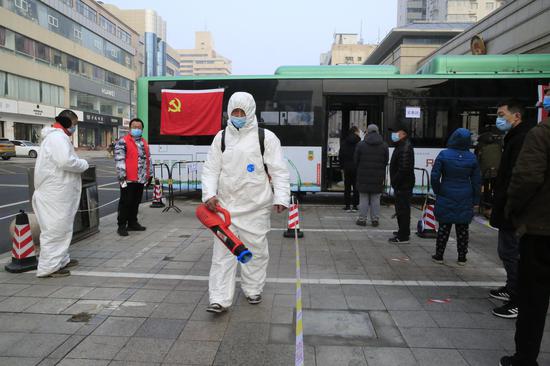After reaching the grim milestone of 800,000 coronavirus deaths in December, the United States continued to shatter records as the Omicron variant surges.
According to Johns Hopkins University, the total number of COVID-19 cases in the United States topped 60 million on Sunday. Just days before, the country had shattered a single-day record with over 1 million infections.
A CNN report on Tuesday estimated that over the past week, more than 754,200 new daily cases, on average, were reported nationwide, which is about three times last winter's peak average, and 4.5 times the peak from the Delta-driven surge.
The grim numbers out of America stand in stark contrast to other countries, including Britain and South Africa, U.S. media outlet The Hill said.
In an article published Tuesday, The Hill quoted Eric Topol, a professor at the Scripps Research Institute who had analyzed a series of data comparing the U.S. daily COVID 19 cases and deaths with other large nations.
As his study showed, the United States has a much higher baseline of deaths per capita because there was "a relative lack of containment during an earlier surge of the Delta variant and a lack of vaccinations."
Data from the U.S. Centers for Disease Control and Prevention indicated that at least one in five eligible Americans -- roughly 65 million people -- are not vaccinated against COVID-19, while only 23 percent are fully vaccinated and boosted.
As the Omicron variant is spreading across the United States, top U.S. infectious disease expert Anthony Fauci said in an interview with CNN on Tuesday that it's likely that just about everybody will be exposed to the strain, but vaccinated people will still fare better.
What is stressing Americans is not just the virus itself. Crises triggered by the pandemic and the rapidly-mutated variants have added another troublesome layer to American society.
The American Red Cross on Tuesday declared its first-ever "national blood crisis" as it faces the worst blood shortage in over a decade.
Despite rising necessity for transfusions due to record hospitalizations, the Red Cross said in a statement that it has seen a 10 percent overall blood donation decline since March 2020.
"Some hospitals may not receive as much as one-quarter of the blood products requested," the organization added, noting that the current situation has not only pushed hospitals to the brink, but also put patients at risk.


















































 京公网安备 11010202009201号
京公网安备 11010202009201号